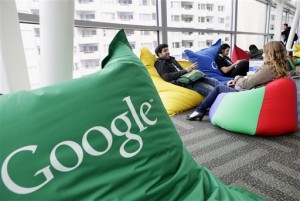
In this May 11, 2011 file photo, attendees chat at the Google IO Developers Conference in San Francisco. Google on Tuesday, May 22, 2012, finalized its $12.5 billion deal for Motorola Mobility, a key manufacturer of smartphones. AP PHOTO/MARCIO JOSE SANCHEZ
SAN FRANCISCO—Google Tuesday finalized its $12.5 billion deal for Motorola Mobility, a key manufacturer of smartphones and other devices which puts the Internet giant in head-to-head competition with Apple.
“The acquisition will enable Google to supercharge the Android ecosystem and will enhance competition in mobile computing,” the California-based Internet giant said in a statement.
“I’m happy to announce the deal has closed. Motorola is a great American tech company, with a track record of over 80 years of innovation,” Google chief executive Larry Page said.
“It’s a great time to be in the mobile business, and I’m confident that the team at Motorola will be creating the next generation of mobile devices that will improve lives for years to come.”
The completion follows approval by Chinese, US and European regulators, amid concerns that Google would keep Android, a free operating system, out of the hands of competitors in the mobile device market.
Conditions from China’s Ministry of Commerce included Google keeping its Android software for gadgets such as smartphones and tablet computers free and open for at least five years.
Regulators in the US and elsewhere have stressed that they will be watching to make sure that the Mountain View, California-based company does not use Motorola Mobility to obtain an unfair advantage in the market.
Google will acquire 17,000 patents with the purchase of Motorola Mobility and has been strengthening its patent portfolio as the fight for dominance in the booming smartphone and tablet market increasingly involves lawsuits claiming infringement of patented technology.
Apple and South Korea’s Samsung, whose devices are powered by Google’s Android software, are currently involved in lengthy and costly patent fights being waged on several continents.
The Android system snagged 51 percent of the US mobile phone operating system market in the three months ending in March, according to comScore, while Apple’s operating system had 30.7 percent.
But in the global tablet market, Apple’s iPad outmuscled its Android-powered rivals in early 2012, according to research firm IDC.
Some analysts have said Google may be content with the patent portfolio, and sell the handset and other hardware operations.
But Page’s comments suggest Google will move headfirst into devices.
“The phones in our pockets have become supercomputers that are changing the way we live,” Page said.
“It’s now possible to do things we used to think were magic, or only possible on Star Trek–like get directions right from where we are standing; watch a video on YouTube; or take a picture and share the moment instantly with friends.”
Independent analyst Jeff Kagan said it appears Google “has big plans in mobile, both with their Android on other makers handsets and with their own Google branded phone.”
Google said it will run Motorola Mobility as a separate business unit, which will be a licensee of Android, the Google operating system for mobile devices.
“Android will remain open,” the company said.
Heading the unit will be “long-time Googler” Dennis Woodside, who will take over from Sanjay Jha, who led the company through this acquisition.
Woodside, who has overseen integration planning for the acquisition, previously served as president of Google’s Americas region.
“Motorola literally invented the entire mobile industry with the first-ever commercial cell phone in 1983,” Woodside said.
“Thirty years later, mobile devices are at the center of the computing revolution. Our aim is simple: to focus Motorola Mobility’s remarkable talent on fewer, bigger bets, and create wonderful devices that are used by people around the world.”
Motorola Mobility was created in 2011 when US-based Motorola Inc. split the company into a mobile devices unit and a government and public safety division known as Motorola Solutions.